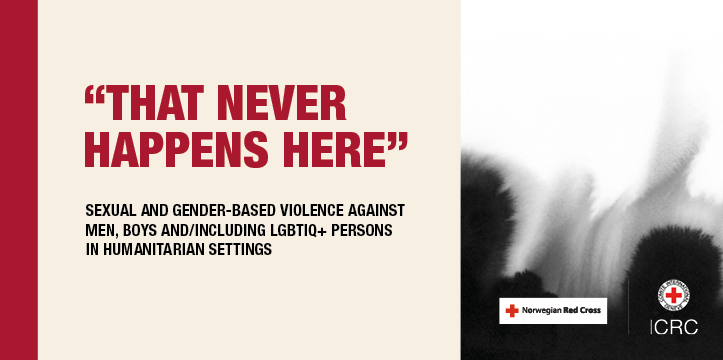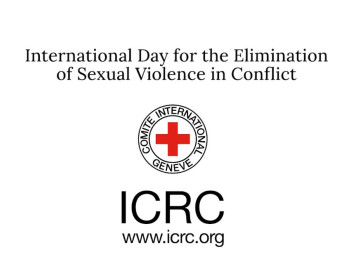“That never happens here”: Sexual and gender-based violence against men, boys, LGBTIQ+ people
"Many humanitarian agencies not only overlook the needs of females, but also completely overlook men, boys and sexual minority groups as sexual and gender-based violence survivors in their needs assessment, discussions with communities, during data collection and follow-up community-based and humanitarian response programming.(ii)"
Sexual and gender-based violence (SGBV) against women and girls in armed conflict, detention or humanitarian crises is horrific, widespread and well documented. They are not alone.
There is now increasing recognition of the diversity of victims/survivors of sexual and gender-based violence in conflict settings and other humanitarian emergencies.
A new report – "That never happens here": Sexual and gender-based violence against men, boys and/including LGBTIQ+ people in humanitarian settings" – highlights the crushing impact and prevalence of SGBV against other overlooked groups.
The report calls for better understanding within the humanitarian community and improved responses to the needs of men, boys and/including LGBTIQ+ victims/survivors.
It also issues a series of recommendations – and a call to action – for states, humanitarian agencies and the International Red Cross and Red Crescent Movement.
"The consequences of sexual and gender-based violence for any person, regardless of gender, age, sexual orientation, gender identity and expression, and other diversity factors, are extensive and devastating.
They often include physical, psychological and socioeconomic dimensions, causing both immediate and long-term harm."
The report draws attention to many undisclosed experiences and unmet needs. They include the following:
- The impact and prevalence of SGBV against men and boys in conflict-affected settings, within the context of migration and in detention, has likely been severely underestimated.
- Due to social and cultural norms linked to masculinity, there are persistent gender stigmas associated with SGBV for male victims/survivors.
- Diversity factors such as sexual orientation, gender identity and expression may influence to what extent a person is at risk. For example, transgender women and girls – who were assigned male at birth but do not identify as men or boys – may be specifically targeted by SGBV as a measure to "correct" their gender identity.
- A gay man in a context where a non-heterosexual sexual orientation is grounds for detention may face an increased risk of SGBV, including while detained.
- Boys in humanitarian settings are at risk of a wide range of SGBV. They may be exposed to sexual violence by weapons bearers, exploited sexually or abused at the hands of humanitarian workers or peacekeepers, or trafficked for the purposes of sexual exploitation.
While sexual violence against men, boys and/including LGBTIQ+ people is prohibited under international humanitarian law (IHL), domestic law is less uniform.
Hence the report's appeal for states to take concerted action towards building inclusive and non-discriminatory domestic legislation prohibiting SGBV and ensuring all victims/survivors have access to justice.
Other recommendations call on states, the International Red Cross and Red Crescent Movement and other humanitarian actors to:
- Establish and sustain programmes and services which include men, boys and/including LGBTIQ+ victims/survivors
- Address harmful service-provider attitudes through training and awareness initiatives.
"As with women and girls, men, boys and LGBTIQ+ survivors require a multi-sectoral and survivor-centred response, with access to medical, psychosocial and counselling services which respond to trauma, including mental health, sexual and reproductive health services," says May Maloney, the head of ICRC's addressing sexual violence team.
"Safety and security, adequate shelter, livelihood support and legal responses are also essential to meeting their needs."
The report stresses that increased attention to the unmet needs of men, boys and/including LGBTIQ+ victims/survivors must not result in a de-prioritization of resources for women and girls, for whom comprehensive services remain largely insufficient.
(i) This report uses "men, boys and/including LGBTIQ+ persons" throughout, in order to draw attention to specific groups who may be at risk of SGBV (in the context of armed conflict, other situations of violence, detention, and before, during, and after other humanitarian crises, including natural disasters), beyond women and girls, who remain disproportionately targeted.
(ii) IFRC, 'The Responsibility to Prevent and Respond to Sexual and Gender-Based Violence in Disasters and Crises', p. 11






